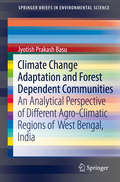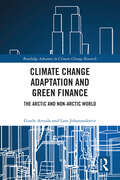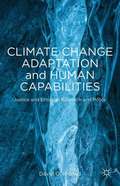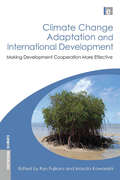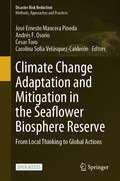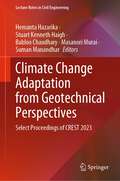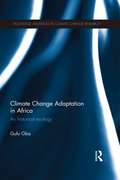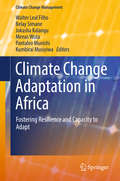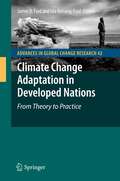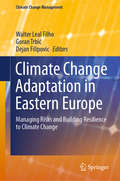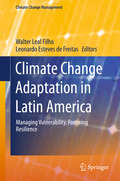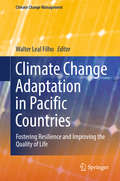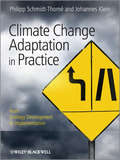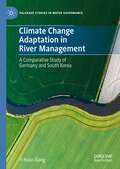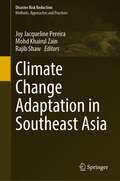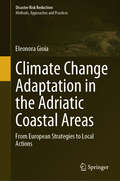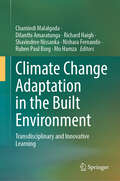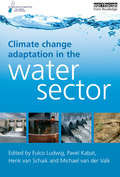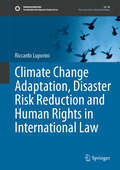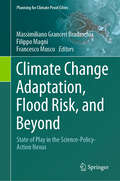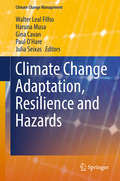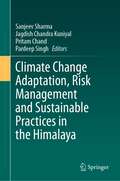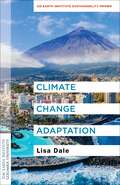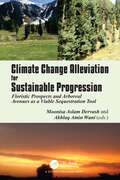- Table View
- List View
Climate Change Adaptation and Forest Dependent Communities: An Analytical Perspective of Different Agro-Climatic Regions of West Bengal, India (SpringerBriefs in Environmental Science)
by Jyotish Prakash BasuThis book addresses the livelihood impacts of climate change, vulnerability and adaptation measures on the forest dependent communities of India. Research presented here focuses on three different agro-climatic areas of West Bengal, namely the coastal Sundarban, the drought-prone region and the mountainous region. Readers will discover the main climate induced vulnerabilities that affect livelihoods of forest communities, understand how to evaluate the expected impacts of climate change at different levels under different climate change scenarios, and be able to assess and measure the implied major social, environmental and economic impacts. Particular attention is also given to the role of the Indian governmental policy (including national forest policy of 1988) to reduce climate-related vulnerabilities. Chapters also highlight two main approaches to vulnerability assessment in socio-ecological systems. The first is the impact-based approach, which assesses the potential impacts of climate change on forest dependent people. The second is the vulnerability-based approach, which assesses social sensitivity and adaptive capacity to respond to stresses. Development practitioners, government implementing agencies, and researchers in environmental science and policy will find this book appealing.
Climate Change Adaptation and Green Finance: The Arctic and Non-Arctic World (Routledge Advances in Climate Change Research)
by Gisele Arruda Lara JohannsdottirThis book presents specific case studies of climate finance in the Arctic and examines how the green revolution could be a game changer in this sensitive region. Bringing together contributions from a range of experts in the field, Climate Change Adaptation and Green Finance assesses the costs of inaction versus the costs of action based on case study examples of climate finance and sustainable investment in the Arctic region. The authors draw on data from the Sixth Assessment Report published by the Intergovernmental Panel on Climate Change and respond with a solutions-based framework. This is developed around the notion of a new, carbon-neutral economy in the Arctic and presents methods for unlocking carbon finance and long-term climate investment in the region, such as finance for Arctic entrepreneurs and resilient sustainable investment structures. This volume also looks at the role of finance in meeting the United Nations Sustainable Development Goals and the ways in which innovation in investment will help shape the future of the Arctic. Climate Change Adaptation and Green Finance will be of great interest to students and scholars of climate change, sustainable finance and sustainable business
Climate Change Adaptation and Green Finance: The Arctic and Non-Arctic World (Routledge Advances in Climate Change Research)
by Gisele Arruda Lara JohannsdottirThis book presents specific case studies of climate finance in the Arctic and examines how the green revolution could be a game changer in this sensitive region.Bringing together contributions from a range of experts in the field, Climate Change Adaptation and Green Finance assesses the costs of inaction versus the costs of action based on case study examples of climate finance and sustainable investment in the Arctic region. The authors draw on data from the Sixth Assessment Report published by the Intergovernmental Panel on Climate Change and respond with a solutions-based framework. This is developed around the notion of a new, carbon-neutral economy in the Arctic and presents methods for unlocking carbon finance and long-term climate investment in the region, such as finance for Arctic entrepreneurs and resilient sustainable investment structures. This volume also looks at the role of finance in meeting the United Nations Sustainable Development Goals and the ways in which innovation in investment will help shape the future of the Arctic. Climate Change Adaptation and Green Finance will be of great interest to students and scholars of climate change, sustainable finance, and sustainable business.
Climate Change Adaptation and Human Capabilities
by David O. KronlidClimate Change Adaptation and Human Capabilities explores learning, health, mobility, and play as climate capabilities and produces new insights into the depth of climate change impact on social life.
Climate Change Adaptation and International Development: Making Development Cooperation More Effective
by Masato Kawanishi Ryo FujikuraClimate change impacts upon the world's poorest most heavily. It is therefore essential that international development initiatives focus on improving the ability of developing countries to adapt to the effects of climate change. This book, a product of research by the JICA-RI (Research Institute of the Japan International Cooperation Agency), examines climate change adaptation from the perspective of development cooperation in order to provide useful lessons for those engaged in research, policy and practice in this vital area. In this book the editors have brought together a wide range of case studies from across Africa and Asia, covering urban and rural areas and different sectors including water, agriculture and disaster management, in order to examine the following: o high-resolution climate change projection in Asia and how this can be used in planning appropriate adaptation responses o in-depth case studies of climate change projections, social, economic and environmental impact and vulnerability assessment and adaptation in rural Thailand and urban Philippines o cases across Africa for which climate data is less readily available and alternative approaches need to be adopted o the current situation amongst international donors o emerging issues caused by climate change In the introductory section, the editors draw together the full implications from the case studies to discuss how international communities can support adaptation in developing countries and to give an assessment of bilateral projects. They reflect on the lessons learned and offer recommendations for future research and international development cooperation.
Climate Change Adaptation and Mitigation in the Seaflower Biosphere Reserve: From Local Thinking to Global Actions (Disaster Risk Reduction)
by José Ernesto Mancera Pineda Andrés F. Osorio Cesar Toro Carolina Sofía Velásquez-CalderónThis open access book addresses the following topics for the Seaflower Biosphere Reserve (BR) in the Colombian Archipelago of San Andrés, Providencia, and Santa Catalina, in the southwest Caribbean Sea, which is the world’s largest BR and contains representative ecosystems of tropical island regions. ● Future regional climate behavior and forms of balanced relationships between humans and nature to promote climate change (CC) adaptation and mitigation strategies for tropical islands. ● The relevance of BRs as ideal locations to study and replicate interdisciplinary adaptation strategies. BRs are “living, dynamic laboratories” where local communities demonstrate safe and sustainable development possibilities. Island and coastal tropical BRs disproportionately face adverse effects of CC, making them a research priority with unprecedented intellectual challenges for their unique characteristics. This collaborative effort ● Stimulates critical and interdisciplinary thinking around tropical island regions ● Presents new and different angles to understand local socioenvironmental impacts of CC ● Demonstrates the linkage between ecosystem services, human well-being, and CC adaptation ● Connects local experiences to global dynamics and processes, and vice versa ● Places the struggles and knowledge of the indigenous Raizal people at the forefront of CC and BR studies ● Examines relevant socioenvironmental pathways toward collective action for adaptive capacity, resilience, and ultimately contributes to sustainable development processes in BRs worldwide. This book was financed by the Corporation Center of Excellence in Marine Sciences (CEMarin).
Climate Change Adaptation from Geotechnical Perspectives: Select Proceedings of CREST 2023 (Lecture Notes in Civil Engineering #447)
by Hemanta Hazarika Stuart Kenneth Haigh Babloo Chaudhary Masanori Murai Suman ManandharThis book presents select proceedings of the 2nd International Conference on Construction Resources for Environmentally Sustainable Technologies (CREST 2023), and focuses on sustainability, promotion of new ideas and innovations in design, construction and maintenance of geotechnical structures with the aim of contributing towards climate change adaptation and disaster resiliency to meet the UN Sustainable Development Goals (SDGs). It presents latest research, information, technological advancement, practical challenges encountered, and solutions adopted in the field of geotechnical engineering for sustainable infrastructure towards climate change adaptation. This volume will be of interest to those in academia and industry alike.
Climate Change Adaptation in Africa: An Historical Ecology (Routledge Advances in Climate Change Research)
by Gufu ObaIn the context of growing global concerns about climate change, this book presents a regional and sub-continental synthesis of pastoralists' responses to past environmental changes and reflects on the lessons for current and future environmental challenges. Drawing from rock art, archaeology, paleoecological data, trade, ancient hydrological technology, vegetation, social memory and historical documentation, this book creates detailed reconstructions of past climate change adaptations across Sahelian Africa. It evaluates the present and future challenges to climate change adaptation in the region in terms of social memory, rainfall variability, environmental change and armed conflicts and examines the ways in which governance and policy drivers may undermine pastoralists’ adaptive strategies. The book’s scope covers the Red Sea coast, Somaliland, Somalia, the Ogaden region of Ethiopia, and northern Kenya, part of the Ethiopian highlands and Eritrea, areas where past climate change has been extreme and future change makes it vital to understand the dynamics of adaptation. This book will be of interest to students and scholars of environmental history, human ecology, geography, climate change, environment studies, development studies, pastoralism, anthropology and African studies.
Climate Change Adaptation in Africa: Fostering Resilience and Capacity to Adapt (Climate Change Management)
by Walter Leal Filho Simane Belay Jokasha Kalangu Wuta Menas Pantaleo Munishi Kumbirai MusiyiwaThis collection showcases experiences from research and field projects in climate change adaptation on the African continent. It includes a set of papers presented at a symposium held in Addis Abeba in February 2016, which brought together international experts to discuss "fostering African resilience and capacity to adapt. " The papers introduce a wide range of methodological approaches and practical case studies to show how climate change adaptation can be implemented in regions and countries across the continent. Responding to the need for more cross-sectoral interaction among the various stakeholders working in the field of climate change adaptation, the book fosters the exchange of information on best practices across the African continent.
Climate Change Adaptation in Developed Nations: From Theory to Practice (Advances in Global Change Research #42)
by James D. Ford Lea Berrang-FordIt is now widely accepted that adaptation will be necessary if we are to manage the risks posed by climate change. What we know about adaptation, however, is limited. While there is a well established body of scholarship proposing assessment approaches and explaining concepts, few studies have examined if and how adaptation is taking place at a national or regional level.
Climate Change Adaptation in Eastern Europe: Managing Risks And Building Resilience To Climate Change (Climate Change Management Ser.)
by Walter Leal Filho Dejan Filipovic Goran TrbicThis book focuses on managing risks and building resilience to climate change, showcasing experiences from research, field projects and best practices to foster climate change adaptation in Eastern Europe that can be implemented elsewhere.Climate change affects countries in Eastern Europe, i.e. the Western Balkans and Southeast Europe in a variety of ways. Apart from severe floods, there are reports of decreasing water reserves in the southern regions, and of gradual changes in biodiversity and agricultural production. In the South Caucasus area, for instance, climate change models project a decline in precipitation and suggest that it will continue to become drier this century.Many Eastern European countries, especially the non-EU ones, have weak national climate policies, and transboundary collaborations, as well as limited public engagement in matters related to climate change. As a result, climate change poses a serious threat to their economic stability and development and to the sustainable development of the region.The above state of affairs illustrates the need for a better understanding of how climate change influences Eastern Europe, and for the identification of processes, methods and tools that may help the countries and the communities in the region to adapt. There is also a perceived need to showcase successful examples of how to cope with the social, economic and political problems posed by floods/droughts in the region, especially ways of increasing the resilience of agriculture systems and of communities.Addressing this need, the book presents papers written by scholars, social practitioners and members of government agencies involved in research and/or climate change projects in Eastern Europe.
Climate Change Adaptation in Latin America: Managing Vulnerability, Fostering Resilience (Climate Change Management)
by Walter Leal Filho Leonardo Esteves de FreitasThis book showcases experiences from research, field projects and best practice in climate change adaptation in countries in the Latin American region, focusing on managing vulnerability and fostering resilience. It includes a selection of papers presented at a specialist symposium on climate change adaptation held in Rio de Janeiro, Brazil in November 2016. Consistent with the need for more cross-sectoral interaction among the various stakeholders working in the field of climate change adaptation in Latin America, the book documents and disseminates the wealth of experiences in the region. It is divided into two main parts: Part 1 addresses the current and future impacts of climate change on fauna, flora and landscapes, while Part 2 is concerned with the socio-economic aspects of climate change adaptation, analyzing some of the main problems prevailing in this vulnerable region and examining ways to address them.
Climate Change Adaptation in Pacific Countries: Fostering Resilience and Improving the Quality of Life (Climate Change Management)
by Walter Leal FilhoThis book showcases vital lessons learned from research, field projects and best practice examples with regard to climate change adaptation in countries throughout the Pacific region, a part of the planet that is particularly vulnerable to and affected by climate change. The book's primary goals are to document the wealth of experiences in the region available today, to encourage cross-sector interactions among the various stakeholders in the region, and to help transfer results to other countries and regions. Accordingly, it gathers a set of papers presented at a symposium on climate change adaptation held in Fiji in July 2016, focusing on "Fostering Resilience and Improving the Quality of Life". In these contributions, local and international experts present a variety of initiatives showing how Pacific countries are coping with the many problems associated with climate change, including initiatives in education and awareness work taking place across the region, operational aspects and their implications for policy-making, and challenges in urban and rural areas.
Climate Change Adaptation in Practice
by Johannes Klein Philipp Schmidt-ThomeClimate change adaptation is increasingly recognized as complementary part to climate change mitigation. Climate change affects sea level, the extent of flood prone areas and precipitation patterns among many others. To adapt to these changes, the tasks of municipalities and cities are to implement policies and strategies for changes in land use and coastal management as part of their future development. It is of vital importance to address the uncertainties of climate change scenarios when proposing adaptation measures that are socially viable and economically reasonable. The decision making process, promoted here, is based on scientific excellence as well on an integrated communication process.This book provides a comprehensive overview of key elements required for effective analysis and assessment of climate change impacts, economic cost-benefit analysis, communication processes and creation and transfer of knowledge, governance issues and implementation of related policies. It describes the results achieved by the BaltCICA (www.baltcica.org) project whose contributors come from the scientific and public administration communities. The regional cooperation has led to the implementation of climate change adaptation in several case studies. The BaltCICA project developed concepts, methodologies and tools for climate change adaptation that can be translated across other global regions. Scientists and students working on the development of climate change and adaptation strategies; public administrators in the related fields on local, regional and state level including environment, water management, civil defense; as well as professionals working with adaptation technologies, including engineering, technological solutions, urban planning agencies and construction, will value this innovative book.
Climate Change Adaptation in River Management: A Comparative Study of Germany and South Korea (Palgrave Studies in Water Governance: Policy and Practice)
by Yi hyun KangThis book examines the approaches to climate change adaptation in water governance taken by South Korea and Germany. By comparing their political decision-making processes, this book explores the factors behind their differences. Adaptation to the changing climate is critical to human society and water is the principal medium through which climate change will affect us. Due to high levels of industrialization and population density, flood control is a high priority in both countries’ adaptation plans. While South Korea has maintained its engineering-oriented flood control policy for river management, Germany has turned its direction from its long-standing technical approach to more nature-based solutions. The evidence of this study indicates that policy change and stability is the result of discourse and institutional interaction, and thus emphasizes the validity of discursive institutionalism. This book will clearly explain why certain policies are adopted for water management and will be an invaluable contribution to the expanding literature on the socio-political aspects of climate change adaptation.
Climate Change Adaptation in Southeast Asia (Disaster Risk Reduction)
by Rajib Shaw Joy Jacqueline Pereira Mohd Khairul ZainThis book highlights the current issues, challenges, and priorities for climate change adaptation in the ten member states of the Association of Southeast Asian Nations (ASEAN). The status of each country was prepared by a consortium of researchers in consultation with National Focal Points of the ASEAN Working Group on Climate Change (AWGCC). National documents on adaptation actions, including local scenario and priorities, were reviewed where available and supplemented with an assessment of scientific publications to identify vulnerable ecosystems and regions. Adaptation needs and priorities were determined through stakeholder consultation in the respective countries. This allows for local-level perspectives to be captured and brought to the attention of policy and decision-makers at the national and regional levels. An important lesson from this exercise is that universities and research institutions at the national level have a critical role to play in bridging the gap between science and policy in climate change adaptation. These institutions also have the capacity to continuously facilitate transfer of the best available science for advancing climate change adaptation at the local level.
Climate Change Adaptation in the Adriatic Coastal Areas: From European Strategies to Local Actions (Disaster Risk Reduction)
by Eleonora GioiaThis book presents the best practices necessary to embed climate change adaptation in the planning processes among the Adriatic coastal communities. Six coastal regions, which are distributed in the Northern, Central, and Southern Adriatic Basin in Italy and Croatia, were taken as reference areas. The book also introduces the state-of-the-art climate change adaptation strategies envisioned or implemented at national and regional governance levels in Europe. Additional details at the sub-regional scale were included in the analysis where possible. Moreover, these strategies were compared to the current and future climate trends on the Adriatic scale, in order to concentrate adaptation efforts on the expected risks. Based on the collected strategies, integrated with a further literature review extended to areas outside the Adriatic Basin, the book promotes a novel database of adaptation actions that includes targets, actors, expected results, and the timing for implementation. Such a database, called the Climate Menu, is publicly available on a web platform designed for the needs of public authorities and other stakeholders to undertake the reduction of climate risks.
Climate Change Adaptation in the Built Environment: Transdisciplinary and Innovative Learning
by Dilanthi Amaratunga Richard Haigh Mo Hamza Chamindi Malalgoda Shavindree Nissanka Nishara Fernando Ruben Paul BorgGlobal climate change is one of the greatest environmental threats facing humanity and it is affecting every country on every continent. Recent evidence confirms a close liaison between climate change induced hazards and the built environment, as the built environment demonstrates a high fragility and vulnerability to hazardous situations. The impact of climate change is particularly pertinent to the built environment given the life expectancy of buildings and the fact that it is essential to adapt the existing built environment to deal with a climate that may be significantly different from that in which it evolved. Coastal regions are highly vulnerable to climate change because, in addition to changes in temperature, precipitation, and more frequent flooding, they will be affected by rising sea levels, wave heights, and accelerated coastal erosion. The built environment exerts considerable influence over coastal communities' local climate and environment. Coastal areas also tend to be highly populated, with many vulnerable urban centres located near the coastal belt. In addressing such challenges, it is important to better understand the impacts of climate change on the built environment and to develop tangible climate adaptation measures for the built environment.
Climate Change Adaptation in the Water Sector
by Michael van der Valk Fulco Ludwig Pavel Kabat Henk Van SchaikToday's climate variability already has a large impact on water supply and protection. Millions of people are affected every year by droughts and floods. Future climate change is likely to make things worse. Many people within the water sector are aware that climate change is expected to have serious consequences for water resource management, but they are unsure how to incorporate climate information into their management structures. Providing a compendium of specific strategies, Climate Change Adaptation in the Water Sector is the first book to show students and professionals in the water sector how to adapt to climate change and variability. It enables advanced students, managers, decision-makers and other practitioners to feel comfortable in analysing and using climate data within the water sector. The book consists of two parts: the first describes the general issues and is written mainly by the editors of the book, while the second part contains specific case studies drawn from a wide range of contrasting countries: Australia, Germany, The Netherlands, the Philippines, South Africa, Thailand and Yemen. Published in association with the Co-operative Programme on Water and Climate, NeWater, UNESCO and WATCH (Water and Global Change)
Climate Change Adaptation, Disaster Risk Reduction and Human Rights in International Law (Sustainable Development Goals Series)
by Riccardo LuporiniClimate change poses an escalating challenge to global society, with climate-related disasters becoming more frequent, severe and widespread in their impact on individuals and communities, and in their interference with human rights. To confront this challenge, States must not only mitigate climate change by reducing greenhouse gas emissions but also adopt comprehensive measures to adapt to its effects and manage climate change-related disaster risk. This book provides an in-depth analysis of the international legal frameworks governing climate change adaptation and disaster risk reduction, focusing on the critical role of human rights in strengthening these frameworks and ensuring their implementation. The study explores the extent to which human rights have been integrated into international climate change and disaster law, examines how climate change-related disaster risk is addressed within international human rights law, and assesses the growing trend of human rights-based climate change and disaster litigation and its potential regulatory impact. The book offers a unique perspective on international lawmaking in the fields of climate change and disaster management while also shedding light on the ongoing development of human rights law as it seeks to address the unprecedented threats posed by climate change and its associated risks.
Climate Change Adaptation, Flood Risk, and Beyond: State of Play in the Science-Policy-Action Nexus (Planning for Climate Proof Cities)
by Francesco Musco Massimiliano Granceri Bradaschia Filippo MagniThis book includes the insights of a seminar that was held at IUAV University of Venice, on May 29th and 30th featuring 10 speakers. 8 speakers, 2 moderators, and 1 organizer from the seminar, plus 10 other authors contributed to this book. The writers’ expertise spans from local climate adaptation planning, public policy analysis, climate and environmental finance, and climate adaptation advocacy to multi-risk analysis, GIS, disaster risk management, ecosystem services assessment, urban geography, art, and civic engagement. The book contents address adaptation and flood risk mitigation along the Science-Policy-Action path - both theoretical and operative perspectives are discussed. EU climate adaptation policy and finance, climate adaptation implementation, flood risk analysis, nature-based solutions, blue ecosystem services, regional adaptation planning, and critical infrastructure adaptation are the topics investigated in depth by the writers.
Climate Change Adaptation, Resilience and Hazards (Climate Change Management)
by Walter Leal Filho Haruna Musa Gina Cavan Paul O'Hare Julia SeixasThis book analyses the links between climate change adaptation, resilience and the impacts of hazards. The contributors cover topics such as climate change adaptation in coastal zones, the evaluation of community land models, climate change considerations in public health and water resource management, as well as conceptual frameworks for understanding vulnerabilities to extreme climate events. The book focuses on a variety of concrete projects, initiatives and strategies currently being implemented across the world. It also presents case studies, trends, data and projects that illustrate how cities, communities and regions have been striving to achieve resilience and have handled hazards.
Climate Change Adaptation, Risk Management and Sustainable Practices in the Himalaya
by Sanjeev Sharma Pardeep Singh Jagdish Chandra Kuniyal Pritam ChandThis volume analyzes ecological and socio-economic risks due to climate change in the Himalayan mountain ecosystems, communities, and proposes adaptation strategies and sustainability practices. In order to better understand the potential actions required to improve natural resource conservation and the development of mountain people's livelihoods. The authors discuss the current status of local knowledge system on various environmental aspects of conservation and sustainable use of mountain resources in the Himalaya. The book addresses the institutional capacities, gaps, and priority areas of capacity building to strengthen policies and governance in regard to climate change, landuse management, biodiversity conservation, and sustainable management in the Himalayan region. The aim of this book is to enhance coordination building among policymakers, planners, mountain communities to foster collaboration between different stakeholders by understanding local perceptions of climate change as well as variability issues, and establishing adaptation strategies to cope with these impacts. The chapters incorporate theoretical and applied aspects, and may serve as baseline information for the sustainability of mountain ecosystems through the contribution of multidisciplinary and interdisciplinary expertise from the Himalayan region. The book will be useful for students, teachers, and researchers working in different areas pertaining to mountain ecosystems, as well as policymakers and planners working on issues related to the sustainability of the mountain ecosystem.
Climate Change Adaptation: An Earth Institute Sustainability Primer (Columbia University Earth Institute Sustainability Primers)
by Lisa DaleClimate change policy has typically emphasized mitigation, calling for reducing emissions and shifting away from fossil fuels. Yet while these efforts have floundered, floods, wildfires, droughts, and other disasters are becoming more frequent and potent. As the risks escalate, we must ask how to adapt to a changing climate. How might farmers modify their practices to maximize food security? Can coastal cities protect their infrastructure from rising seas? Are there strategic ways for developing countries to combine climate resilience with economic growth and poverty reduction? For people and societies around the world, these questions are not theoretical: adaptation is already underway.This book offers a concise overview of climate adaptation governance. In clear, accessible language, Lisa Dale describes key strategies that governments, communities, and the private sector are now deploying. She presents the theory and practice that underlie climate adaptation efforts at local and global scales, providing illuminating case studies that foreground the problems facing developing countries. Dale analyzes the effectiveness of a range of policy interventions, drawing out principles of good governance and discussing how practitioners can navigate complex tradeoffs. She emphasizes equity and inclusion, considering how climate adaptation policy can account for the needs of historically disadvantaged groups. Written for a wide audience, this book is an invaluable introduction for all readers interested in how societies can meet the challenges of an altered climate.
Climate Change Alleviation for Sustainable Progression: Floristic Prospects and Arboreal Avenues as a Viable Sequestration Tool
by Akhlaq Amin WaniThe change in climatic conditions has resulted in a series of events from the melting of polar ice to the rising of sea levels. This has affected low-lying coastal areas by endangering plants and animals, agriculture and livelihood patterns in general, not to mention causing the outbreak of diseases like dengue, malaria, etc. It is, thus, imperative that mitigation measures to stabilize or reduce the concentration of carbon dioxide is brought about. A key step is the bio-fixation of carbon from the atmosphere. This book attempts to bring forth the role of vegetation in carbon sequestration. The introductory chapters of the book deal with the understanding of the physical attributes governing climate on earth, historical account of climate change, impacts of climate change on different environs and eco-strategies to combat climate change. Detailed account of mechanism of carbon sources and sinks, carbon credits and REDD+ are also discussed. A sizeable portion of the book is dedicated to the climate change and phonological variability, clean development mechanism and economic stability through natural resource management. Academicians, researchers, policy makers and environmental stakeholders will find it a useful and comprehensive guide in the floristic and arboreal potential to sequester carbon dioxide and will suffice the diverse needs of teaching and research.
